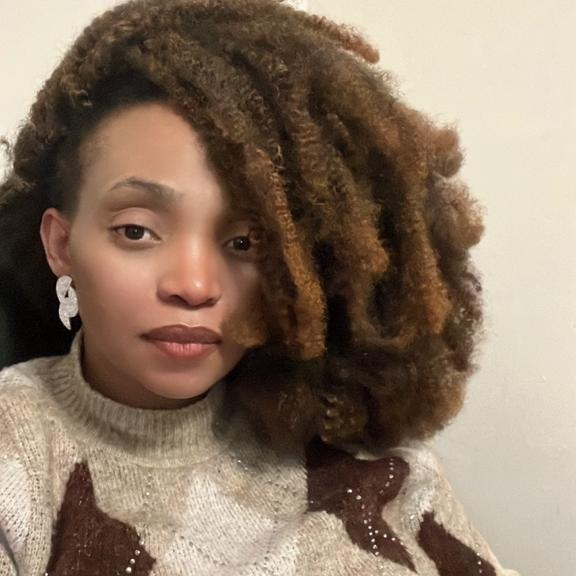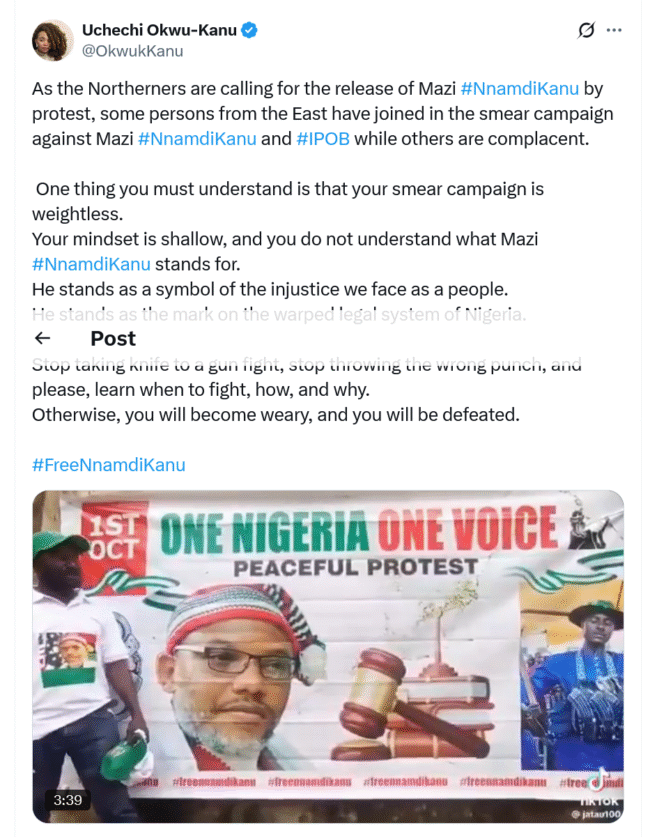
The Struggle for Justice: Uchechi Okwu-Kanu Speaks as Nationwide Protests Demand Nnamdi Kanu’s Release
United Kingdom – September 30, 2025
Uchechi Okwu-Kanu, wife of the leader of the Indigenous People of Biafra (IPOB), Mazi Nnamdi Kanu, has responded through her verified social media channels to the growing nationwide calls for her husband’s release, including the increasingly vocal appeals coming from northern Nigeria.
In her statement, Uchechi noted that while northerners were courageously organizing protests in solidarity, “some persons from the East have joined in the smear campaign … while others are complacent.” She dismissed such attacks as “weightless,” urging critics to recognize what Kanu represents: a symbol of injustice and a living critique of Nigeria’s broken legal system.
She warned against reckless actions that aim to weaken the cause, writing: “Stop taking knife to a gun fight. Learn when to fight, how, and why.” Her call for strategic restraint underlines the importance of channeling energy toward meaningful, coordinated efforts rather than divisions.
Her post comes at a time when communities across Nigeria, including unexpected voices from the North are holding demonstrations to demand Kanu’s freedom. This cross-regional support reflects the growing acknowledgment that his detention is not just an IPOB issue but a Nigerian problem rooted in systemic abuse of power.
Mazi Nnamdi Kanu’s ordeal highlights this abuse. He was abducted by the Nigerian government from Kenya in June 2021, tortured for eight days, and illegally renditioned to Nigeria. Since then, he has been kept in solitary confinement at the DSS facility, in clear violation of both Nigerian and international law.
Human rights organizations, including the United Nations Working Group on Arbitrary Detention, have condemned the abduction and extraordinary rendition as unlawful. In 2022, the UN body declared his detention illegal and ordered Nigeria to release and compensate him immediately.
By continuing to prosecute him, the Nigerian state is not only flouting international law but also undermining its own legal credibility.
Supporters of Kanu argue that the ongoing protests are aimed at securing his freedom and exposing the human rights abuses at the heart of his case. Far from being destabilizing, these protests affirm Nigerians’ demand for justice and accountability. The real source of instability lies in the government’s refusal to obey both domestic and international rulings.
At its core, IPOB’s demand is simple: that the Nigerian government respect democratic principles by allowing the Biafran people to decide their future through a referendum. IPOB maintains that Nigeria, as currently constituted, is unsustainable, and that self-determination through peaceful, democratic means is the most viable path forward.
In this light, Uchechi Okwu-Kanu’s message is more than just a rebuttal to critics, it is a rallying call for discipline, unity, and strategic persistence. Her words underscore that the struggle for Kanu’s release is ultimately a struggle for justice, democracy, and the rule of law, not only in Nigeria but globally.
